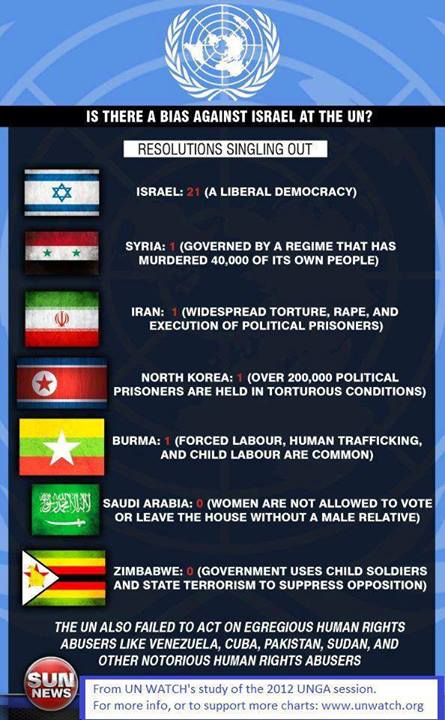Certainly, Israel believe it is unfairly treated at the UN. In 2023
Israel's Security Council (SC) representative wore the same kind of
yellow badge the Nazis forced Jews to wear during the Holocaust:

Implication being that the supposed UN discrimination his country
faces at the UN would be caused by antisemitism. This is far from the
first time the UN has been accused of bias. History is full of
examples. Thomas M. Franck wrote in 1985:
no indictment of the U.N. has been made more frequently or with
greater vehemence than that it singles out Western and pro-Western
states for obloquy, while ignoring far worse excesses committed by
socialist and Third World nations.
In 2022 Indonesia branded the UN "biased" after experts
highlighted "Shocking Abuses" in Indonesia's Papua region. South
Africa in the 1960s and 1970s repeatedly accused the UN of bias
when it highlighted the state's discriminatory Apartheid system. And
in 1933, Japan felt so mistreated - after the League of Nations voted
42-1 to condemn Japanse aggression in Manchuria - that it renounced
its membership in protest.
According to legal scholar Noura Erakat, the disproportionate
amount of attention the Question of Palestine gets is because all
other cases of colonialism has been resolved:
Rather it reflects the fact that of all cases of colonialism that
have occupied the attention of the League of Nations since 1920 and
the UN since its establishment in 1945, Palestine is the single
outstanding case to actually not achieve its self-determination.
[...] The only way to stand by a statement that the UN is biased
against Israel is to occlude this history and elide the fact that
Israel is a colonial power that today singles itself out by its
insistence that it remains above the law and an exception to the
norm of decolonization and independence.
Thus, Palestine is the exception to an otherwise post-colonial world
order.
According to professor Richard Falk claiming anti-Israel bias is a
deliberate tactic used by Israel:
It [Israel] both pretends to be victimized by the organization,
and yet because of its relationship to the U.S. and its clever use
of these tactics, it intimidates the organization more than any
other government however large or small, [...]
Rather than being biased [against Israel, the United Nations]
leans over backward in every particular context to make sure that
Israel’s best arguments are made fully available and given as much
attention as possible. In other words, the reality is just the
opposite of the perception in this country. If anything, the
organization could be criticized as being indifferent to the
Palestinian reality and biased toward not offending Israel.
Furthermore, it should be noted that the SC, which can hardly be
accused of anti-Israel bias, is vastly more powerful than all other UN
bodies. The huff and puff of the Human Rights Council carries
little weight in comparison to the SC who, to date, has not subjected
Israel of a single punitive measure. Israel has not been
subjected to sanctions or embargoes and no Israeli political or
military leader has been added to the SCs sanctions list. Contrast
that to its authorization of the 1990 Iraq war, the subsequent (for
Iraq) catastrophic sanctions regime, its isolation of Iran, and its
repeated condemnations of North Korea. The latter two for attempting
to develop nuclear weapons, something Israel already have.
Sources

